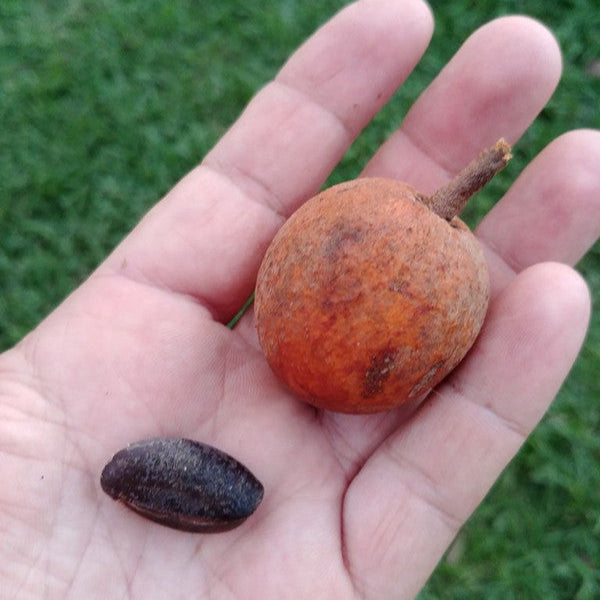Love it? Add to your wishlist
Your favorites, all in one place. Shop quickly and easily with the wishlist feature!
[message]
[title]
[message]

Veliyath Gardens
Couldn't load pickup availability
Abiurana (Chrysophyllum prieurii): A Rare Heirloom from the Tropics with Modern-Day Appeal
Introduction to a Botanical Jewel
Among the lesser-known but truly captivating fruit trees of the tropics, Abiurana—scientifically known as Chrysophyllum prieurii—holds a special place. Belonging to the Sapotaceae family, this unique tree is native to parts of South America, particularly Brazil, Ecuador, and Panama. Revered for its unusual trunk-bearing fruits and medicinal potential, Abiurana is slowly emerging from forest shadows to take its rightful place in specialty gardens and plant collections around the world.
At Veliyath Gardens, we proudly offer this rare tropical delight to enthusiasts who appreciate the timeless beauty and ecological value of exotic fruit trees. Here's a deeper look into this extraordinary species and what makes it an unforgettable addition to your plant garden.
Common Name: Abiurana
Scientific/Botanical Name: Chrysophyllum prieurii
Other Regional Names: In some parts of Brazil, it is simply called "Abiurana da Mata" (forest Abiurana); in local Ecuadorian communities, it is referred to as "Abiurana blanca" due to its light pulp; Panamanians call it “Abiurana silvestre.”
Native to the humid lowland forests and wet rainforests of South America, especially Brazil, Panama, and Ecuador.
Grows in tropical regions at elevations up to 800 meters.
Favors rich, well-drained soils and thrives in both primary and secondary forests.
Its cauliflorous growth pattern—bearing fruits and flowers directly on the trunk—adds to its dramatic and ornamental value.
A medium to large tree, it can reach heights of 20 to 30 meters in its native habitat.
Features a straight trunk with greyish bark and a rounded canopy.
The tree is self-supporting and evergreen, offering year-round shade and greenery.
Flowers are small, creamy, and lightly fragrant, blooming directly from the trunk and major branches.
The fruit is greenish-yellow to orange-brown, small to medium-sized, and oval to round in shape.
Inside, the pulp is soft, juicy, and sweet with a mild tang, reminiscent of custard with citrus undertones.
Eaten fresh, it offers a refreshing experience—ideal during hot summer months.
In traditional communities, the fruit is consumed raw or used in sweetened pulp preparations, juices, and sometimes cooked with honey.
It makes a unique ingredient in natural smoothies, tropical fruit bowls, and desserts for those seeking something beyond the ordinary.
Rich in Vitamin C, which strengthens the immune system and enhances skin health.
A good source of Vitamin B3 (Niacin)—essential for energy production and neurological function.
Contains antioxidants that help protect the body from cellular damage and chronic disease.
The dietary fiber in the pulp supports digestion, prevents constipation, and improves gut health.
Anti-inflammatory properties help reduce symptoms of conditions like arthritis and joint stiffness.
Traditionally used in folk medicine for treating mild respiratory issues and general fatigue.
In Brazil and Panama, the Abiurana is considered a “forest gift”, often shared among communities during harvest season.
The tree is respected for its ecological contribution, supporting native wildlife and promoting biodiversity.
In some indigenous cultures, the fruit pulp is mixed with herbal infusions to promote general well-being and strength during seasonal changes.
Growth Time: The plant typically begins flowering and fruiting within 4 to 5 years under good care.
Sunlight: Prefers partial to full sunlight.
Soil: Grows best in well-drained, loamy or sandy soil with good organic content.
Watering: Requires consistent moisture, especially during the early growth stages. Avoid waterlogging.
Maintenance Level: Moderate, making it ideal for garden enthusiasts who can devote occasional attention.
Suitable for both botanical gardens and home orchards in tropical and subtropical climates.
Once harvested, the fruit should be consumed within a few days, as its soft pulp can spoil quickly.
Can be refrigerated for short-term storage—preferably unwashed until ready to eat.
Pulp can be extracted and frozen for later use in juices or desserts.
In native regions, it’s sometimes dried or mixed with natural sugar or salt and preserved in airtight containers.
With its low-to-moderate maintenance needs, Abiurana fits perfectly into both home gardens and professional landscapes.
It brings visual interest with its trunk-borne fruits, enriching your garden with something truly rare.
Health-conscious individuals can benefit from its nutritional richness and natural medicinal properties.
The soft, sweet, and tangy flavor of the fruit adds a refreshing twist to your diet, whether eaten fresh or blended into tropical treats.
At Veliyath Gardens, our mission is to preserve and share rare botanical wonders with plant lovers around the world. The Abiurana fruit tree is one such rare find—sourced, grown, and nurtured under expert care, ready to thrive in your space.
Whether you are an explorer of new tastes, a botanical collector, or someone looking to create a fruit plant garden rich with character and history, Abiurana (Chrysophyllum prieurii) is a worthy addition.
Let your garden tell the story of nature’s rarest treasures. Make Abiurana part of your living legacy.
Growth Time: The plant typically begins flowering and fruiting within 4 to 5 years under good care.
Sunlight: Prefers partial to full sunlight.
Soil: Grows best in well-drained, loamy or sandy soil with good organic content.
Watering: Requires consistent moisture, especially during the early growth stages. Avoid waterlogging.
Maintenance Level: Moderate, making it ideal for garden enthusiasts who can devote occasional attention.
Rich in Vitamin C, which strengthens the immune system and enhances skin health.
A good source of Vitamin B3 (Niacin)—essential for energy production and neurological function.
Contains antioxidants that help protect the body from cellular damage and chronic disease.
The dietary fiber in the pulp supports digestion, prevents constipation, and improves gut health.
With its low-to-moderate maintenance needs, Abiurana fits perfectly into both home gardens and professional landscapes.
It brings visual interest with its trunk-borne fruits, enriching your garden with something truly rare.
Health-conscious individuals can benefit from its nutritional richness and natural medicinal properties.


